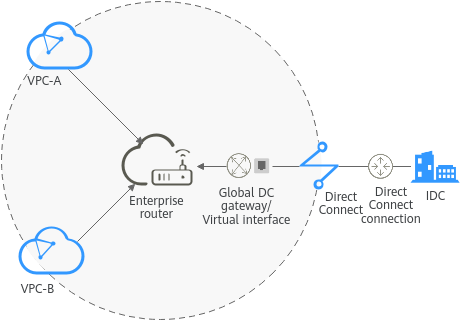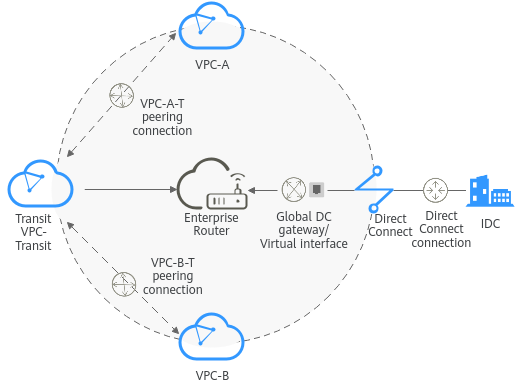Selecting a Networking Scheme
You can use enterprise routers to build a central network and to simplify the network architecture. There are two typical schemes to use Enterprise Router together with Direct Connect to allow an on-premises data center to access multiple VPCs. For details, see Table 1.
Figure 1 Networking for allowing an on-premises data center to access two service VPCs directly (scheme 1)

Figure 2 Networking for allowing an on-premises data center to access two service VPCs over a transit VPC (scheme 2)

Scheme | Networking Architecture | Network Path Description | Remarks |
|---|---|---|---|
Scheme 1 | Two service VPCs (VPC-A and VPC-B) and the Direct Connect virtual gateway are attached to an enterprise router. |
| For details, see How Do I Select a Networking Scheme? |
Scheme 2 | The two service VPCs (VPC-A and VPC-B) are not attached to the enterprise router. Instead, a transit VPC (VPC-Transit) is used. The transit VPC and the Direct Connect virtual gateway are attached to the enterprise router. |
|
How Do I Select a Networking Scheme?
In scheme 1, the service VPCs are directly attached to the enterprise router. In scheme 2, a transit VPC is used and attached to the enterprise router. Each service VPC is connected to the transit VPC over a VPC peering connection. Compared with scheme 1, scheme 2 costs less and eliminates some constraints, as detailed below:
- Scheme 2 frees you from the following constraints that scheme 1 has on attaching service VPCs to an enterprise router:
- If a service VPC is used by a shared load balancer, VPC endpoint, private NAT gateway, or DCS resource, contact customer service to confirm the service compatibility and preferentially use a transit VPC for networking.
- Traffic cannot be forwarded from a VPC to its attached enterprise router if the destination of a route with an enterprise router as the next hop is set to 0.0.0.0/0 in the VPC route table and if:
- An ECS in the VPC has an EIP bound.
- The VPC is being used by ELB (either dedicated or shared load balancers), NAT Gateway, VPC Endpoint, or DCS.
- If a VPC attached to an enterprise router has a NAT gateway associated and Scenario of the SNAT or DNAT rules is set to Direct Connect, the network from the on-premises data center to the VPC is disconnected.
If you still want to use scheme 1 to attach service VPCs to an enterprise router, contact customer service to evaluate the feasibility.
- How Do I Select a Networking Scheme?